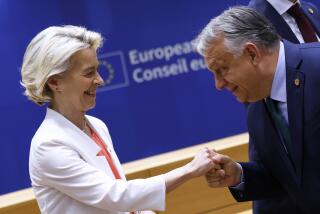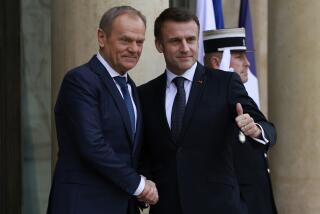A More Powerful Europe
- Share via
Athens, the birthplace of Western democracy, is a fitting site for nations from the former East Bloc to commit to joining the European Union. At an EU meeting, the 15 members voted Wednesday to admit 10 new members in what would be the EU’s largest expansion. But the nitty-gritty of the meeting was about divisions in the Iraq war between “new” and “old” Europe, as Secretary of Defense Donald H. Rumsfeld had sarcastically put it. Even British Prime Minister Tony Blair and French President Jacques Chirac, at loggerheads over Iraq, presented a common front in calling for a stronger United Nations role in rebuilding Iraq.
None of this spells “The End of the American Era,” to quote the apocalyptic title of scholar Charles A. Kupchan’s new book forecasting that Europe will surpass the U.S. as a great power. A corrupt U.S. political system and flabby economy, he contends, mean that America will not effectively confront the European “economic behemoth on the horizon.”
This is only a half-truth. The German economy is in the doldrums and almost all Western European countries face the expense of aging populations. But the era of Europe as an economic power and a political dwarf is coming to an end.
The 10 new nations would bring 75 million more people into the EU, for a total population of 450 million. If U.S.-European relations were to continue to slide, an economic “Fortress Europe” could develop, keeping out American products. The politics of the EU are also becoming less tentative. Former French President Valery Giscard d’Estaing, who heads a 105-member committee writing a new European constitution, said he would soon introduce a draft of the proposed text. A constitution would strip some power from individual nations and strengthen a centralized Europe that could act with one voice. The EU leaders expect to approve it this summer before submitting it to their parliaments.
Conservatives like cyber-pundit Andrew Sullivan are calling for an “Anglosphere” that consists of countries that value national sovereignty and won’t give it up to organizations like the EU. But European unity is moving ahead, and President Bush owes Blair, his steady Iraq ally, support in his efforts to patch things up in Europe. The U.S. should also show some grace in exchange for the $432 million in aid that the European Union has just agreed to provide in Afghanistan. The U.S. will need more than that in Iraq and shouldn’t cut Europe out of the discussion.
More to Read
Sign up for Essential California
The most important California stories and recommendations in your inbox every morning.
You may occasionally receive promotional content from the Los Angeles Times.












